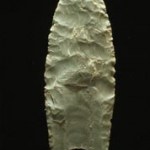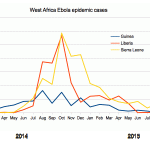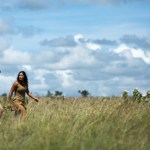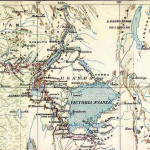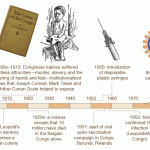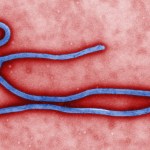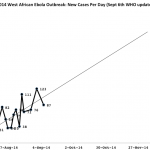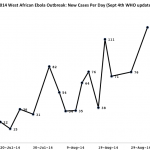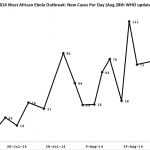Africa
My father in law is an excellent amateur mixologist. I don't drink alcohol very often, but we're all up at the cabins, so last night I had a paper plane. And I believe this is what led to a night of strange and extensive dreams, and in my dreams was my recently deceased PhD adviser, Irv DeVore. (Irv was not dead in the dream.) DeVore is famous for having initiated, with Richard Lee, the first scientific study of extant living foragers, and they worked with the Ju/'Honasi of Botswana/Namibia/South Africa.
So, it was strange to have the lingering dream on my mind as I opened the latest…
You've heard to story. I'm here to give you a little context.
A pretty typical early handaxe, made by a Homo erectus. This was a big flake made from a bigger rock. The big flake was subsequently flaked to make this handaxe. The word "handaxe" can be spelled about nine different ways.
But in case you haven't heard the story, this is from the press release which is, so far, the only information generally available:
New finds of fossils and stone tools from the archaeological site of Jebel Irhoud, Morocco, push back the origins of our species by one hundred thousand years and show that by…
A claim is being made, in a recent issue of Nature Magazine, that humans were active in the vicinity of San Diego well over 100,000 years before archaeologists think humans were even in the New World. Most commentary on this claim dismisses it out of hand, but out of hand rejections are no better than foundationless assertions. Let's take a closer look at the Cerutti Mastodon Site. But first, some important context.
The Near Consensus on North American Prehistory
The Clovis Culture is a Native American phenomenon that occurred between about 12 and 10 thousand years ago (most likely between…
The Lese people practice swidden horticulture in the Ituri Forest, Congo (formerly Zaire). Living in the same area are the Efe people, sometimes known as Pygmies (but that may be an inappropriate term). The Efe and Lese share a culture, in a sense, but are distinct entities within that culture, as distinct as any people living integrated by side by side ever are. The Efe are hunter-gatherers, but the gathering of wild food part of that is largely supplanted by a traditional system of tacit exchange between Efe women and Lese farmers, whereby the Efe provide labor and the farmers provide…
I just watched, at a the Twin Cities Science Film Festival, a film called Nzara '76, which is about the first known Ebola outbreak, the one that gave it its name, in southern Sudan. That's about 150 miles, as the Mvo-Mvo flies, north of my long term project area in the Ituri Forest, an impassable distance over an unforgiving terrain if you are a person, well within the migratory range of an Ebola carrying fruit bat.
Back in the day, when Ebola would strike here and there, killing dozens, then disappearing back into the wild as quickly as it came, there was not much movement to get a…
The Great Human Race is a new production of National Geographic, in three parts. I recently viewed the first episode, "Dawn" which comes with this description:
All people can trace their roots to the savanna of East Africa, the home of one of the first members of the human species -- Homo habilis. Archaeologist Bill Schindler and survival instructor Cat Bigney face what early man did as they work together to survive in the wild savanna just as these primitive people did 2.6 million years ago -- without any weapons or fire. But they soon find that living like our ancestors is harder than…
I am listening Pretoria! Since there have been so many wonderful discussions led by students from the University of Pretoria over the last couple of years (refer to the comments), I thought I would recognize this wonderful place. First of all, thank you for being so actively involved in the blog for your classes. I am sure your professors are proud. Since the university has over 230 different degrees, diplomas or certificates, I cannot determine which program you are from, but I appreciate your support.
Nature reserves and walks in Pretoria, South Africa are home to an…
A recent twitter conversation prompted me to dig up some old posts on cannibalism, and maybe a few memories of my time in Central Africa.
The twitter conversation concerned a story in which it is claimed that James Jameson, heir to the Jameson Irish whiskey empire, bought a slave girl (for the price of six handkerchiefs) in order to watch her be eviscerated and eaten by cannibals, and in particular, so that he could make some nice watercolor painting of the event. Apparently this is going around the internet.
If this is true, which as I will argue in a moment is not actually the case, then…
Left to right, Granny Beck, my Grandma June, and Great-Great Grandma Bertha, circa 1961. Who knows what was on the menu that day.
My Great-Grandpa and Granny Beck were, in some ways, ahead of their time. My Grandpa’s mom and step-dad, they both went through scandalous divorces and then switched partners with another couple, Granny Orpha marrying Wade and my Grandpa’s dad Lee marrying Wade’s ex-wife, Edna. Orpha and Wade raised 5 of Orpha’s boys together, and had a daughter after the divorce/remarriage.
By the time I was born, my Granny Beck was in her 80s, and I have only vague…
A City of Death and Misery
Everything I’m about to tell you in this story is true.1 You might not want to read this story while you are alone or while sitting in the dark.2
Kimberley South Africa is said to be the most haunted city in the world, and it certainly is a city with a remarkable and dark history. The culture of Kimberley is constructed from the usual colonial framework on which are draped the tragic lives of representatives from almost every native culture from thousands of kilometers around, as well as the seemingly ubiquitous Europeans with their greed, their unexamined privilege…
Jim Moore and I were both students in the PhD Program in Anthropology at Harvard a few years ago. He graduated about the time I entered the program. To give a rough historical touchstone, I remember the day he needed to get his thesis off to the Registrar, and there was a delay because it was taking longer than expected to deburst the pages fresh out of the printer. Anyway, Jim is Professor of Anthropology at UC San Diego, and has done a great deal of work with Old World Primates, the evolution of social systems, and related topics. A while back Jim wrote an important piece for American…
I realize that yesterday’s post was even longer than my usual post (and, given who I am, that’s saying something), but there was a thought that popped up last night about the Ebola conspiracy theories that I discussed that I can’t resist finishing the week on with a (hopefully) much more concise post. (I know, it’s me; conciseness is not exactly what Orac is about.) I know that, after a decade at this whole skeptical blogging thing, it shouldn’t bother me, but it still does. I’m referring to what these Ebola virus disease conspiracy theories say about how “they” view “us.”
First of all,…
According to a new statement from the CDC, while Ebola is deadly to humans and animals, it is very difficult to catch. Therefore, they concluded that pets are not at significant risk of Ebola in the US. Moreover, there have been no reports of dogs or cats becoming ill in Africa. For more information, visit the CDC website
http://www.cdc.gov/vhf/ebola/transmission/qas-pets.html
Just a quick note. The UN Security Council has ad its first ever emergency meeting over a health issue, specifically the current West African Ebola outbreak. From a summary in Science, the Council ...
... unanimously passed a resolution that declared the spread of the virus a “threat to international peace and security” and called on the world to send more health care workers and supplies to Liberia, Sierra Leone, and Guinea, and not to isolate those countries.
...
U.S. Ambassador to the United Nations Samantha Power, who chaired today's meeting, noted that the resolution had 130 co-sponsors…
Gregg Mitman's article in the September 17th New England Journal of Medicine, "Ebola in a Stew of Fear," is unfortunately all too prescient. Dr. Mitman highlighted "the ecology of fear" in Western Africa. Fear is present on both the part of Westerners (scared of Africa's yellow fever, malaria, Ebola, its mere "different-ness"), and by native Africans (of whites' history of colonization and slavery, of medical exploitation dating back well over a century). Fear of each other.
This history of fear, the cultural legacy of decades of mistrust of both Western people and their medical…
In the earlier days of the West African Ebola outbreak, it was not uncommon to hear people note that we should not panic about Ebola because, after all, far more people are killed from Malaria than Ebola. This is of course an irrelevant argument. That is like telling a person who has lost their family in a tragic airplane accident that it isn't so bad because, after all, far more people die in car crashes than aircraft crashes. For example, on August 5th, James Bell write in the Guardian, in a piece called Concerned about Ebola? You’re worrying about the wrong disease:
Since the Ebola…
The news is bleak. I don't have a lot of confidence in the reported numbers. At one time it was said that on a nice Saturday in the summer, four out of five cars driving around in downtown Boston were looking for a parking place. This is somewhat like the situation in Liberia and possibly other affected areas. There may be as many Ebola victims driving around in taxis looking for a clinic as there are in clinics. Or maybe a fewer. Or, maybe more. Maybe a lot more.
But, we have to work with the data we have. There are two charts based on the information provided by WHO for up through…
I'm just posting the graph and very little info right now. The per day rate of new cases is currently about 123 cases per day, the total number of suspected, confirmed, etc. cases is 3,685 with 1841 fatalities. These numbers no longer include Nigeria (and the one case in Senegal is not included either).
WHO has put out very few updates in the last several days. The most current update is August 28th, and it pertains to information from August 26th and before. Based on that update, the total number of cases (confirmed, suspected, etc.) is ow 3069 with 1552 deaths. The number of new cases per day may be increasing, may be decreasing; hard to say at this point. Here's the new cases per day since the second week of July:
Senegal now has one case, a person who traveled there from Guinea. He had contact with a lot of people including health workers and family before it was figured he may have…
We can now be pretty sure that the Ebola outbreak in the DR Congo is not an extension of the West African outbreak. The index case seems to have gotten the disease from a mammal she butchered, and the numerous other cases seem to stem from contact with her primary as health care workers and family members. I don't think we have enough information yet to assess this outbreak vis-a-vis the genetics of the Ebola itself.
From WHO:
On 26 August 2014, the Ministry of Health, Democratic Republic of the Congo (DRC) notified the World Health Organization (WHO) of an outbreak of Ebola virus disease (…


